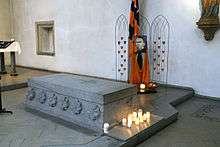Minoritenkirche (Cologne)
The Minoritenkirche or Church of the Immaculate Conception (German - St. Mariä Empfängnis) is a Roman Catholic church on the Kolpingplatz in Cologne. Built in the 13th century, it is now used by the Franciscan and the Kolpingwerk social association.
.jpg)

It is notable for containing the tombs of Duns Scotus and Adolph Kolping, both of whom were beatified by Pope John Paul II - Kolping was also ordained priest in the church. Kolping and Scotus both feature on the new west doors designed by Paul Nagel in 2006.
History
Typically for Franciscan abbey churches, it was built in the Gothic style. It took from 1245 to about 1260 to build its early-Gothic choir, with a three-aisle nave added in the 14th century. As they Franciscans were a mendicant order, they built a ridge turret but no bell tower. When the French Revolution spread to Cologne in 1794, the Franciscans were expelled from the church and the adjoining monastery. The occupying forces seized the buildings in 1804 and four years later turned them into the headquarters for secular social work in the city.
In 1846 the church was handed over to the city's cathedral chapter for use as an annexe church to Cologne Cathedral and four years later archbishop Johannes von Geissel made it the diocesan church for confirmations and ordinations. He also instigated a restoration which was completed in 1862, partly thanks to a 40,000 Taler donation from the businessman Johann Heinrich Richartz (1795–1861), who had already set up the Wallraf-Richartz-Museum on the former site of the monastery buildings.
Organ
A new Romanus Seifert & Sohn organ was installed in 1997, with 44 registers, divided into three manuals and pedals, with mechanical trackers and electrical registers. The expression pedal is equipped with Barker levers.
|
|
|
| ||||||||||||||||||||||||||||||||||||||||||||||||||||||||||||||||||||||||||||||||||||||||||||||||||||||||||||||||||||||||||||||||||||||||||||||||||||
- Stops: II/I, III/I, III/II, I/P, II/P, III/P
- Stops: 768-fache combination action
Bells
The ridge-turret houses two bells, both cast in Münster by Feldmann & Marschel. They replace two bells cast in 1754 and 1853 which were destroyed during the Second World War.[1] As with the 'Kirchen am Neumarkt' (St. Aposteln, the Antoniterkirche and St. Peter), both bells ring at 16:45 on Saturdays and Sundays, whilst the 'Marienglocke' rings the Angelus on its own at 19:30 each evening.
| Nr. | Name | Cast in | Diameter (mm) | Weight (kg) | Nominal (16tel) | Inscription |
| 1 | Maria | 1954 | 790 | 280 | h1 –2 | „Maria, mein erstes Geläut preiset dein Heiliges Jahr. Immaculata, dir singet jubelnd mein Mund immerdar." |
| 2 | Kolping | 1952 | 660 | 160 | d2 ±0 | „1711 ward ich gegossen / 1865 verkündete ich Kolpings Tod / 1942 ward ich ins Mark getroffen / 1952 erstand ich neu nach schwerer Not / Im Leiden stählt sich die Seele." |
References
- Hoffs, Gerhard. "Glocken katholischer Kirchen Kölns" (PDF) (in German). p. 59. Archived from the original (PDF) on 29 January 2017. Retrieved 12 November 2019.
Bibliography (in German)
- Hans-Joachim Kracht: Adolph Kolping: Priester, Pädagoge, Publizist im Dienst christlicher Sozialreform. Herder Verlag. Freiburg im Breisgau u. a. 1993, S. 159–163, ISBN 3451213273.
- Heinrich Neu: Die Minoritenkirche zu Köln. Münster-Verlag, Köln 1949.
- Bernhard Ridder: Kolpings Grabeskirche, das Familienheiligtum der Kolpingssöhne, Kolping Verlag, Köln 1958.